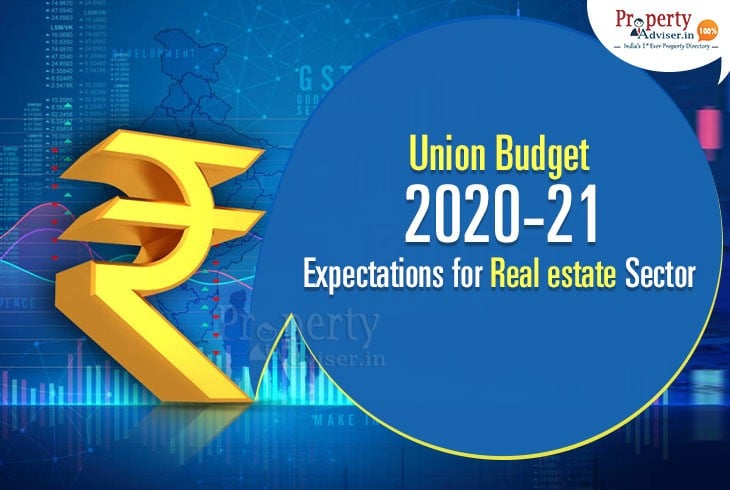The union budget 2019-20 has reported mixed responses from the real estate market in India, lauding measures for affordable housing and infrastructure, as well as the development of rental housing. However, builders and developers are skeptical, that the budget has not addressed the long-term expectations for the industry in terms of status, single window clearance and reforms in the Goods and Services Tax (GST) and have clinched their expectations for union budget 2020 date that is on February 1st, 2020.
The Indian real estate sector has its purpose of welcoming the fact that the Finance Minister has announced a range of budget benefits both for builders and home buyers. These measures are expected to boost the housing industry and provide home buyers with plenty of investment opportunities. Although union budget 2019 has its highlights for the real estate, it was not able to address the most pressing concerns of the sector, like an increase in sufficient numbers of consumers and investors returning to the market, excluding affordable housing.
Glitches of Budget 2019 & Expectations of Budget 2020 for Real estate Sector
Income Tax Slab 2020-21 for First Time Middle-Class Buyers
Finance Minister Nirmala Sitharaman, during her first maiden budget, has announced an increase of Rs 3.5 lakh tax deduction cap on the interest paid on home loans approved for the acquisition of the first home purchase up to Rs 45 Lakh in the financial year. It was proposed allowing an additional deduction of up to Rs 1.5 lakh of interest paid on loans leased up to 31 March 2020 in the purchase of an affordable house of up to Rs 45 lakh, noting that interest payable on housing loans was currently permitted as an allowance of Rs 2 lakh.
However, some players in the industry have criticized Rs 45-Lakh on the value of affordable taxable houses. Although the sector appreciates the focus on affordable housing and PMAY, the government has at the same time missed the main segment of first-time middle-class buyers who expected a lot from the budget 2019-2020 before they purchased the first house. This has created a considerable ignorance gap for the middle-class housing segment and hence have piped up the expectations for budget 2020 date for real estate.
Never-Ending Single-Window Clearance and Industry Status Issue
Budget 2019-2020 ignored some significant issues, including real estate industry status and single-window clearance. Developers and buyers had certain expectations that these issues, when taken into consideration, would have made a significant difference in the Housing for All' by 2022. Although the state accorded the industry status for affordable housing in 2017, builders and developers agree that it should apply to the industry as a whole.
Experts say that without the classification of the industry, the use of legal funds by banks and other financial institutions has been problematic for the real estate industry. Single window project clearance is another long-standing request that is considered to be addressed in the budget 2020. Since the developers already need to obtain multiple permits and approvals, with a lack of single-window clearance, it may take 18 to 36 months before any project starts.
ITC & REITs Needs an Extra Boost-Up Plans
In the previous union budget 2019, the GST council streamlined the criteria on the use of Input Tax Credit (ITC) on under-construction properties. But the complete restoration of ITC was needed by the developers to recover from their ongoing financial pressure. It would have also helped to boost sales since the homebuyers can also share the benefits.
Real Estate Investment Trust (REITs) have already broken several benchmarks in the real estate sector, adding new dimensions. Not only did the cash market expanded, but the flow of institutional funds also increased rapidly. In addition to a few deficiencies, this investment tool needed much more incentives to encourage more investors. The government needs to announce encouraging movements as well as infrastructural developments that can attract further foreign investment in the sector and support the employment sector to strengthen it further.
Attention Required for Infrastructural Development & Land Reforms
There is no question about the government's priority on the construction of infrastructure. Still, its plan to spend 100 Lakh on infrastructure in the next five years will produce real economic benefits only if a more aggressive execution happens on the ground. Bottlenecks that hamper the growth of infrastructure in the past need to be rectified.
The new lower 15 percent tax rate for businesses looking to set up new factories can only be enforced if the land acquisition process is simple and straightforward. Implementing a unique identity number or land UID is expected to increase transparency in the Indian land record system. Thus can boost the mechanism of clearance for real estate projects and can also draw more foreign investments for Indian real estate
The Crux of the Matter for Loan Crisis
According to Fitch Rating's, with some 10 billion dollars of developer’s loan coming to be paid back in the first half of budget 2020, the fallout could extend to mainstream banks which have borrowed money from the shadow lenders or invested in their bonds. Things have now reached a critical stage, however, because a credit crisis affected shadow banks, both builders and home buyers, as significant borrowers. Although 25 Crore stress funds have been allotted for stalled projects, they are much needed to be utilized to full potential without any delay relieve the situation.
The recent decrease in the repo rate, in conjunction with Homebuyers, has further increased new hopes. Homebuyers can now exercise their confidence in raising the cost of higher EMI loans. The Government can announce more tax advantages in accordance with section 80C and can change the income tax sheet in the future budget announcements. This increases the number of prospective homebuyers, as it increases their purchasing trust.
Conclusion
The real estate market in India is also expected to address the liquidity crisis faced by the government potentially. In September last year, the crisis appeared after a number of its commercial documents, which affected various segments, including the real estate industry, defaulted on significant IL&FS infrastructure loans. Taking all these into considerations, anticipations for union budget 2020 have been increasing among the real estate stakeholders.
Want to stay updated with the latest real estate news and find all properties for sale in Hyderabad? Browse PropertyAdviser.in to put an end to your home quest and subscribe to our newsletter to get the daily digest of trending real estate news to your inbox.
By Govi

















